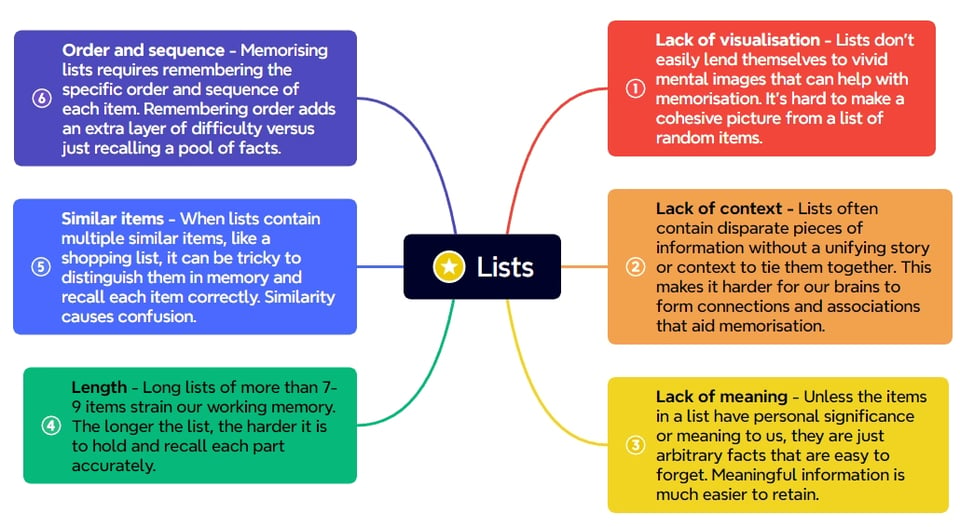LLTT Newsletter #8 - November 2023

LLTT - Issue #7 - November 2023

This month's edition is a tad shorter than previous issues, but there are some valuable ideas nonetheless. Read on!
Why lists in a dictation can be tricky
Notwithstanding you will not find a list in an examination of more than three items, there are a few reasons why lists can be more difficult to work with than other types of information:

The key to memorising lists is to find ways to give meaning, organisation, structure, vivid images, and associations to the information. Things like acronyms, chunking, rhyming, visualisation, linking to existing memories, and repetition can all help lists stick better in long-term memory.
Handling unseen dictation that's too fast
Mastering fast dictation poses a formidable challenge for shorthand students who are yet to acclimate to its rapid pace. Initially, the experience might be intimidating, even overwhelming. However, it's crucial to recognise that embracing this challenge is a gateway to significant improvement over time.
You just have to try. And then try again! And again :)
When confronted with swift dictation, adopting a holistic approach by listening in "phrases" rather than fixating on individual words can be a game-changer. This technique allows you to capture the essence of the spoken content without getting bogged down by the sheer speed of delivery.
Above all, maintaining a continuous flow with your pen is paramount. In the face of missed words or a momentary lapse in focus, you must resist the urge to halt or backtrack. This will take a lot of practice. Instead, take a composed breath, reassert your determination, and seamlessly transition into capturing the next phrase. The ability to stay calm and sustain momentum is pivotal when navigating through rapid dictations. Surrendering to the challenge won't foster the patience and resilient mindset necessary for conquering speed hurdles.
Post-dictation, dedicate time to review your transcribed notes meticulously. Identify and rectify any errors, utilising contextual cues to fill gaps and refine messy outlines. View each high-speed passage as a valuable learning experience that contributes to the refinement of both your writing and reading skills. Celebrate minor victories along the way and engage in introspection, questioning areas where further improvement is needed.
Personalisation is key in the journey to handling challenging situations adeptly. Regularly practise specialised outlines and groupings for frequently occurring words and phrases, enhancing your ability to navigate through the complexities of rapid dictation.
Progress in shorthand proficiency is an investment that matures over time. Daily practice is the cornerstone of success, gradually yielding dividends in the form of enhanced speed and accuracy. Each session serves as a building block in the construction of a skill set that withstands the trials of accelerated dictation. You can succeed. Don't give up. Never give up.
Interesting Links
A curated collection of interesting links that may ignite your curiosity or broaden your horizons.
Screen Capture For Fast & Effective Communication
https://zight.com/Efficiently capture, edit, and share AI-powered screen recordings, screenshots and GIFS to elevate collaboration.
The Psychology of Colours and Their Meanings
When it comes to communication, colour is unbeatable. Unconscious or otherwise, colour can evoke emotions, inspire reactions, and change modes of thinking. It can excite or soothe your mood, raise or lower your blood pressure, and even whet your appetite! Whether it’s innate or learned, it’s undeniable that colour has a vital impact on how we go about our lives.

Color Psychology 101: A Beginner's Guide to the Meaning of Colors
The complete guide to understand how colors impact your psychology, behavior and emotions. Learn the meaning & psychology of colors and what they symbolize.
Recent updates
If you missed any of our posts this past month, here are some links that are worth checking out:
Man Arrested on Suspicion of Arson
Soundcloud
As of this month, there are more than 368 graded audio dictation files available for your revision work on Soundcloud.
Our next issue will be in January 2024.
Thanks for reading!
Visit us at the LLTT Website, YouTube, Twitter, Facebook, Instagram, Quizlet and Soundcloud.
If you have suggestions or topics you'd like to see covered in future newsletters, please contact us: https://www.letsloveteelinetogether.com/contact-us.
If you find this newsletter helpful, please forward to a Teeline friend and suggest they sign up!
A Parting Thought

"Don't Get Worried. Don't Get Stressed. Let's Love Teeline Together."

Add a comment: